Let’s talk about the shelf life, storage, and spoilage signs of sour cream.
Say you have a half-open sour cream container in the fridge that’s been there for a few days already. And you’re wondering: how long does sour cream last, exactly?
Or maybe you’re not quite sure yours is still okay to eat, and you want to make sure. That’s why you want to know what spoilage signs to look for.
If either sounds familiar, you’re in the right place. Read on.
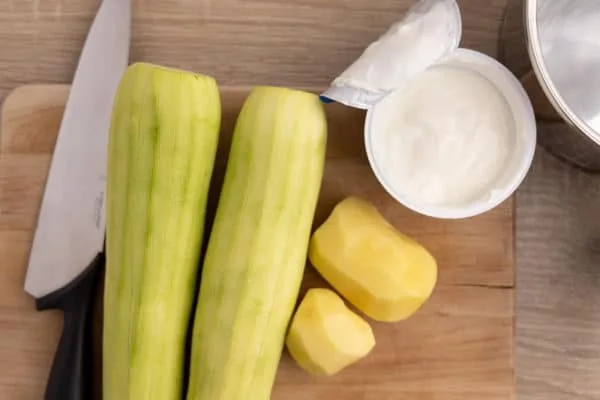
Table of Contents
- Does Sour Cream Go Bad?
- How to Tell if Sour Cream Is Bad?
- How Long Does Sour Cream Last?
- How To Store Sour Cream?
- Can You Freeze Sour Cream?
- How to Freeze Sour Cream
Does Sour Cream Go Bad?
All dairy products spoil, and sour cream is no different. Sure, sour cream is a fermented product, which basically means it’s already “spoiled,” but it doesn’t mean it can’t grow mold or become too sour to eat.
That said, thanks to its acidity, it keeps better than most other fresh (not aged) dairy products and doesn’t go bad within a few days of opening the container.
It’s nowhere near butter in terms of long-lasting, but still. For instance, it keeps longer than heavy cream, its not-fermented cousin.
With that in mind, let’s talk about spoilage signs.
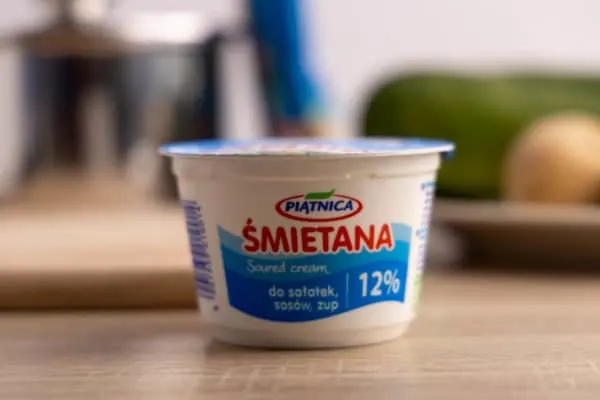
How to Tell if Sour Cream Is Bad?
Your sour cream is bad if there’s mold in the container or the cream has turned yellow. It’s also bad if it smells off or super sour, or it’s completely separated. Finally, toss your sour cream if it’s more than a week past the printed date.
Those are the spoilage signs in a nutshell.
Now, let’s expand on each of those, as some of them are obvious, while others not so much.
First, the cream is not good if there’s mold, dark specs, or other discolorations on the surface. The same is true if your sour cream is no longer white but has turned yellow instead.
Next up, let’s talk about smell. Sour cream obviously smells a bit sour, but that’s about it. If yours smells intensely, it’s probably quite old and too strong to use. In other words, it’s no good.
Likewise, if it gives off a “funny” or a bad odor, it’s no good either.
When it comes to texture, sour cream, similar to cottage cheese, gets a bit watery on top. That separation on the surface is natural and harmless. Just stir it in or drain the water.
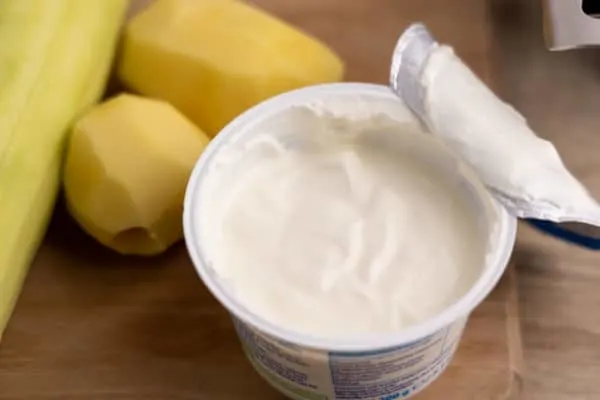
And if separation bothers you, try to make the surface of the product smooth before refrigeration to reduce separation.
But if the whole thing has separated into two layers: a fairly dense white blob on the bottom and a finger’s width worth of water on top, it’s done for.
If everything up to this point seems fine, give the sour cream a taste and decide if it’s good enough to use or not. If it’s too sour for your liking, toss it for quality purposes.
Finally, if you already store your sour cream for much longer than recommended, you should toss it even if it seems perfectly fine.
And speaking of recommended storage periods, let’s talk about the shelf life of sour cream.
How Long Does Sour Cream Last?
Sour cream typically lasts for up to a week past the printed date. Once you open the container, the leftovers keep quality for between a few days if the cream is old and two weeks if it’s fresh.
Each sour cream container comes with a date on the label, and no matter the phrasing, it’s not a safety date or expiration date. It’s a conservative estimate of how long the product will retain optimal quality.
Because of that, sour cream usually keeps for about a week beyond that date, sometimes even a bit longer.
But that’s not to say that sour cream will always be fine to eat a week past its date. If it sits too long at a warm temperature (say in transit or before it gets to the refrigerated section), it might as well spoil much earlier.
That said, don’t go crazy with using “expired” sour cream. If the container is more than two weeks past its date, get rid of it. Better safe than sorry.

After Opening
Once you open the container, sour cream stays fresh for up to two weeks, depending on how old the product is. If it’s already past the printed date, it’ll likely retain quality for only a few days, maybe up to a week.
To make sure your sour cream retains quality for as long as possible, seal the leftovers tight in a resealable container. If you leave the product in its original container topped with its foil seal, it’ll likely dry out or grow mold much sooner than after two weeks.
Next, give your leftover sour cream a quick once-over before every use to ensure it’s still okay to use.
Last but not least, if the product is fresh, you should still use it within two weeks of opening, even if the printed date is still in the future.
Knowing that, it’s time to talk about how to keep sour cream from going bad. Or, in other words, how you should store it.
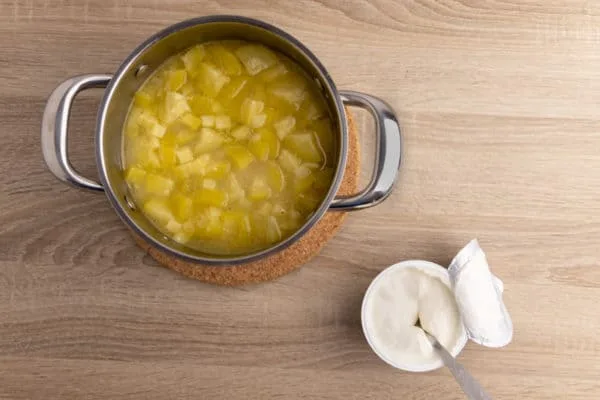
How To Store Sour Cream?
You store sour cream the same way you store other dairy products like yogurt or buttermilk.
First off, keep it always refrigerated, and if it’s an option, keep it in the far corner instead of the door, where the temperature fluctuates the most.
If you put sour cream in that far corner, make a plan on how and when to use it, so it won’t get forgotten and tossed out after a few weeks.
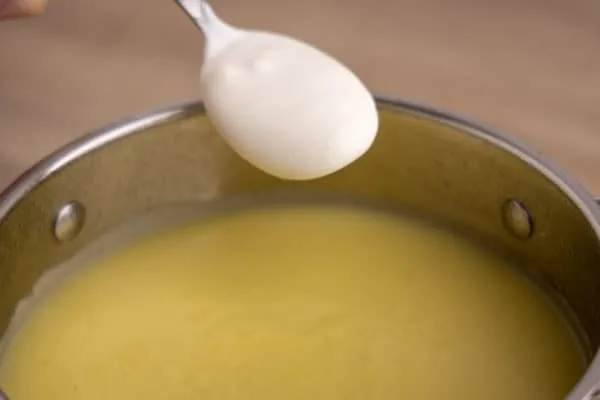
Once you open the container, keep it always sealed tightly.
If it only comes with a foil seal, consider transferring it to an airtight container, especially if you expect to store it in the fridge for more than a few days.
Like with other condiments, always use clean spoons to scoop sour cream. I know that when you’re whipping up a salad, it’s easier to use the spoon you already have instead of reaching for a new one, but it’s important not to be lazy here.
“Double-dipping” is never a good idea, and that’s especially true for condiments that go bad easily, such as sour cream.
If you accidentally left sour cream out overnight, no matter if the container is unopened or not, just toss it out. The product might still be okay, but you never know, and it’s better to err on the side of caution in such a situation.

Can You Freeze Sour Cream?
Producers say that you shouldn’t freeze sour cream.
Freezing affects the texture and might even change the flavor to some extent. That’s definitely true, and if that’s a possibility, it’s better to freeze the prepared dish with sour cream instead of freezing this condiment alone.
But many people make freezing sour cream work, and you can too.
The trick here, and it works for many other dairy products as well, is to use the frozen and thawed sour cream in a cooked or baked dish.
If you add the sour cream to a soup or need it for a cake you’re making, the slightly altered consistency isn’t that big of a deal. It will be mixed with other ingredients anyway, and the difference in the taste of the prepared dish will be negligible.
Try freezing sour cream and using it in a dish or two and see how it goes. If it does, great; if not, try other recipes or simply don’t freeze the product at all.
How to Freeze Sour Cream
Since you most likely need only a small amount of the product at a time, it’s probably best to freeze it in an ice cube tray or a muffin tin.
To do that, just pour the sour cream into the container of your choice and chuck it into the freezer.
Once the cubes are frozen, transfer them to a freezer bag and back into the freezer.
Whenever you need some sour cream, take as many cubes as you need out of the bag and use it.
If you need sour cream for soup, you can throw the frozen cubes directly into the pot.
When it comes to thawing, it’s best to do it overnight in the fridge.